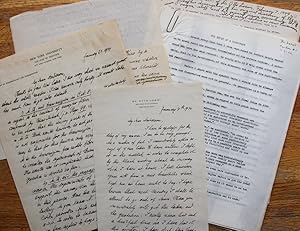Descripción
Collection consisting of: two autograph letters, signed, by Otto Loewi, 5 pages, one autograph letter fragment by Loewi, 1 page, 28 page carbon typescript The Story of a Discovery, dated 1946 by Otto Loewi, 2 typescript transcriptions of the Loewi letters above, with manuscript corrections, 6 pages. Small archive of material consisting of two autograph letters dated 1944 by Loewi to William Ruthrauff Amberson (1915-1977), plus one autograph letter fragment, of Loewi?s to Amberson, including the remains of a February 7, 1944 letter, describing Loewi?s discovery of acetylcholine. Plus, two typescript copies of the text of that letter, with corrections. The archive includes a carbon of Loewi?s ?The Story of a Discovery?, dated 7/31/1946. The text may have been written to be given as a lecture. We can find no evidence that the account, as written here, apparently the text of a lecture, was ever published. It is not cited in biographical references on Loewi. However, Loewi wrote about his discovery in 1934, and later, in his An Autobiographic Sketch, 1960. Otto Loewi was born June 3, 1873, in Frankfurt-am-Main, Germany, the son of Jacob Loewi, a wine merchant, and Anna Willstätter. Loewi attended his local Gymnasium, and in 1891 entered the Universities of Munich and Strassburg as a medical student. Apart from his attendance at the inspiring anatomy courses of Gustav Schwalbe, however, he seldom went to the medical lectures, being more inclined to those held in the philosophical department. Only in 1893 did he begin to prepare for his first medical examination, which he just managed to pass. It was not until the autumn of 1894 that his indifference to medicine suddenly gave way to almost enthusiastic interest. In 1896 he was awarded his medical degree at Strassburg University, his thesis dealing with a subject suggested by Professor Oswald Schmiedeberg, the famous ?Father of Pharmacology?. Also instrumental in his medical education were: Bernhard Naunyn, clinician and experimental pathologist, Oscar Minkowski, And Adolph Magnus-Levy. After graduation he took a course in inorganic analytical chemistry with Martin Freund, in Frankfurt, and afterwards spent a few months working in the biochemical institute of Franz Hofmeister in Strassburg. During 1897-1898 he was assistant to Carl von Noorden, clinician at the City Hospital in Frankfurt. There he witnessed the high mortality in the countless cases of advanced tuberculosis and pneumonia, left without any treatment because of a lack of therapy, he decided to drop his intention to become a clinician and instead to carry out research in basic medical science, particularly pharmacology. In 1898 he became the assistant of Professor Hans Horst Meyer, the renowned pharmacologist at the University of Marburg-an-der-Lahn, from 1904 Professor of Pharmacology in Vienna. In 1905 Loewi became Associate Professor at Meyer?s laboratory, and in 1909 he was appointed to the Chair of Pharmacology in Graz. During his first years in Marburg, Loewi?s studies were in the field of metabolism. As a result of his work on the action of phlorhizin, and another one on nuclein metabolism in man, he was appointed Lecturer in 1900. Two years later he published his paper Über Eiweiss syntese im Tierkörper,(On protein synthesis in the animal body), proving that animals are able to rebuild their proteins from their degradation products, the amino acids ? an essential discovery with regard to nutrition. That year he also published the first part of a series of papers about experimental contributions to the physiology and pharmacology of kidney function. In 1902, Loewi also spent some months in E. H. Starling?s laboratory in London, where he also worked with W. M. Bayliss, Starling?s brother-in-law. And it was in this laboratory that he first met his lifelong friend Henry Dale, who was later to share the Nobel Prize with him. After his return to Marbur. N° de ref. del artículo 030695
Contactar al vendedor
Denunciar este artículo
![]()
